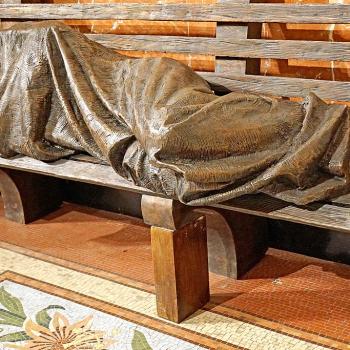
I have many concerns about the 2024 presidential election in the United States. I especially have issue with the way many Christians are treating the election. They have lost sight of the purpose of government, which is to promote and protect the common good. They have lost sight of the way Christ denied the devil when the devil tempted Jesus with worldly power, for they find themselves succumbing to that temptation, seeking power, not for the sake of the common good, but to enforce Christianity and particular Christian morality upon everyone. They have ended up denying religious liberty, thinking it is only for themselves, and not others, as can be seen in the way they want to treat Muslims (and even Jews). They have fallen for Christian nationalism and integralism, leading them to support those candidates who tempt them to embrace their dark side, those who tell them it is good to take power and use it to enforce every aspect of Christian morality upon the general populace, especially those elements which relate to private moral concerns (such as sexuality). Their focus is off, as they ignore the more important, foundational elements of Christian morality (such as the dignity of the human person, and the freedom which people should have as a result of it), elements which tend to be universal norms (often labeled by the Christian tradition as those norms found in the natural law). Government should not be concerned about policing private morality that does not connect with the purpose of government; it especially should not be used to create a legalistic, tyrannical society where the people find themselves afraid to live. The Christian tradition has long understood that the government should not concern itself with enforcing Christianity, especially minor elements of Christian morality, by the rule of law, especially as they have understood when governments try to do so, they make things worse and not better (as Sts. Thomas Aquinas and Augustine believed happened when prostitution is made illegal).
In democratic presidential elections, we should be electing those who promote and work for the common good, that is, those who have positions which are going to do the most good and the least harm to society. We must also recognize, for now, there are two candidates which can be elected, and so when we vote, we need to take that into consideration. We should also consider how likely politicians will be able to do what they say, both for good, as well as for ill, using that when we consider who it is we should vote for. It is important that we do not become one issue voters, because, if we are, no matter how important that issue is, we can lose sight of other equal, or more important goods, and in this way, where some good is denied or ignored, evil is given the room it needs to establish itself and destroy society from within (after all, every evil uses some good to justify itself and its actions). We should not only be concerned with our own particular interests, but promoting what is best for all and the future of society (and humanity as a whole). We must support the candidate who will do the best to secures the common good, even if they do not support every good, every issue which we believe they should, or that their way of dealing with and promoting various issues ends up being disappointing because it is worse than what we believe they should be doing. That is, we must not let the perfect become the enemy of the good. If we believe a particular candidate represents the best possible future for society and humanity as a whole, when comparing them to the other candidates(s), indeed, if the other candidate(s) threaten the common good and the basic principles of the common good, and would likely cause grave harm to society if they gain power, we must support the candidate who will best defend the common good, even if we find them to be less than perfect. We certainly must not allow the imperfection of a candidate turn us away from supporting them when the other candidate will lead to the destruction of society as we know it.
It should be obvious, between the stated goals given by Donald Trump and Kamala Harris, who promotes the common good, who is concerned about the future (of the country, and indeed, humanity), and who is not.
Trump has often indicated he wants to change the system, to even become a “dictator” on day one, and that he has no qualms disregarding the Constitution if and when it gets in his way. He shows no concern about the welfare of humanity, but rather, he is interested in how to use the power of the state to help a few people, that is, himself and his allies. He consistently shows his desire to destroy the governmental system because that system has in play checks and balances which would stop him from taking absolute control. Trump has also shown he does not care about the future of humanity as can be seen in the way he disregards the environment and the protections which need to be put in place in order for humanity to have a future. He threatens to round up and send away (to their potential death) millions of people in the United States, those who he deems as outsiders, such as migrants and refugees coming from countries he does not like; he does not care if they are here legally or not, or if they are already American citizens, as he has said he wants to remove citizenship of many people and deport them with all those he likewise dislikes. He has no problem calling for the imprisonment of his critics. He has no problem giving public support to tyrants around the world, like Putin, even as he indicates he would support and encourage Israel to act in unjust ways, ways which would likely be deemed as war crimes.
Kamala Harris is the opposite of Trump. She promotes the common good. She promotes and wants to defend the system which is in place. She wants to find ways the government can do better to help those in need instead of only relying upon private charity, as can be seen in the way she wants to improve the health care system in the United States and ways to deal with the housing shortage affecting millions of Americans. She is concerned about the environment, and wants to make sure it is protected, and where needed, to do what she can to make sure the damage we have caused can be fixed. While admittedly, she is not perfect in regards migrants and refugees, she wants to find a better way to deal with them, understanding the conditions which have caused them to come to the United State, and because of it, she would be willing to look for better, more humane policies, hoping to find a way to reform the system to make it easier for those who need legal access to the United States can have it. She certainly is for proper free speech, and so, does not threaten people merely because they stand against her and her policies. She does not support Putin, and she wants a better resolution with Israel and the Palestinians than Trump ( for she has indicated she promotes a two-state solution, one which recognizes the innocents found both in Israel and in Palestinian territories). Even if one can find fault with her strategy in dealing with the crisis in the Middle East, she is interested in finding a way to have it resolved, and to help all the innocents suffering as a result of the war, meaning, it is far more likely she can be convinced to change and do better than Trump, who shows his usual contempt and disinterest in the humanity of those involved. Indeed, even if one finds many of her policies and positions lacking, inferior to what they would wish them to be, they should see she is concerned for the common good and will not seek to undermine it in such a way to bring about a despotic nightmare, which should be enough for people to vote for her instead of Trump.
Christians should remember what government is about: it is meant to work for the good of all, and not just their own private interests. That is, government should not be putting special Christian beliefs and practices above others, but should work for religious liberty and the common good, respecting the rights of religion when religion does not threaten the common good. Christians must not succumb to the temptation to power, to give in to the devil in a way Christ did not, taking power to rule the world and use it to rule the world with an iron fist, trying to force others to follow Christianity. They should not be tricked by politicians who promise them that power, for, by accepting such power, they will become corrupted. This is why Christian nationalism never connects with the message of the Gospel, for Christian nationalism is about power, and the will to power, using Christianity as a tool for power, as a form of identity, but only in regards the externals of Christianity, and never about the basic principles Christ set up, such as those found in the Sermon on the Mount. Christ has told his followers to deny such power-seeking, to deny themselves and pick up their cross, following after him in promoting the good, not for themselves alone, but for all. Christian nationalism, on the other hand, denies the need to pick up the cross, to follow after Christ, but instead says those who identify themselves as Christians should seek power in the world, to do what they can to attain it and enjoy all the benefits it gives them, looking after their own good, and not the common good. Thus, Christians in the United States, must take seriously the common good, and deny the temptation to power which Trump has given them. They must support Harris, even if there are elements of her policies which they wish were different.
*Personal Reflections And Speculations
Stay in touch! Like A Little Bit of Nothing on Facebook.
If you liked what you read, please consider sharing it with your friends and family!
N.B.: While I read comments to moderate them, I rarely respond to them. If I don’t respond to your comment directly, don’t assume I am unthankful for it. I appreciate it. But I want readers to feel free to ask questions, and hopefully, dialogue with each other. I have shared what I wanted to say, though some responses will get a brief reply by me, or, if I find it interesting and something I can engage fully, as the foundation for another post. I have had many posts inspired or improved upon thanks to my readers.













